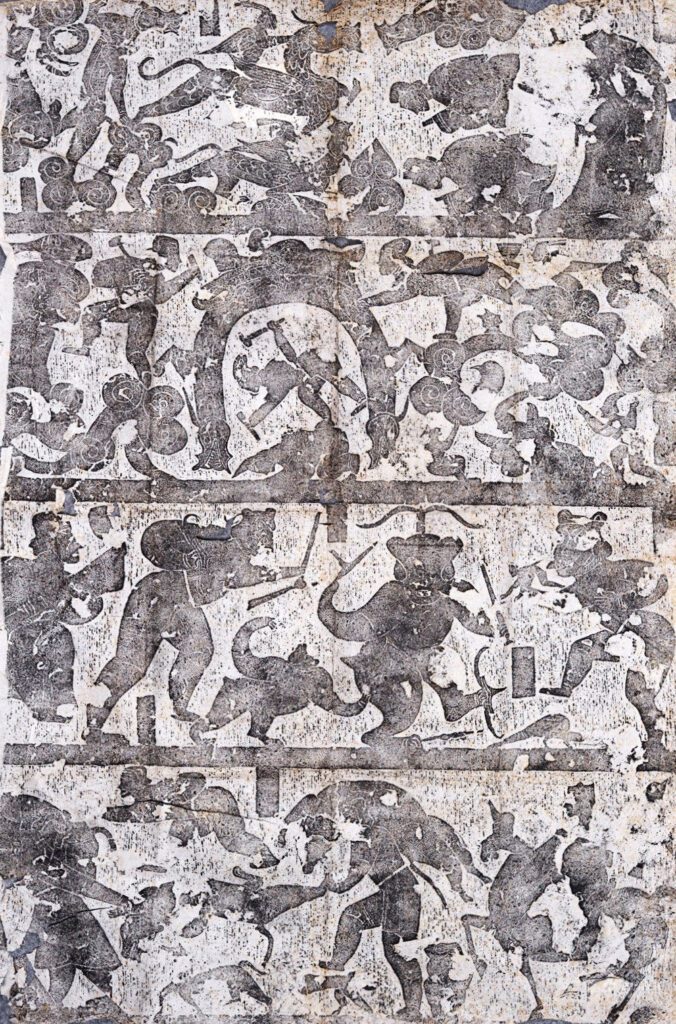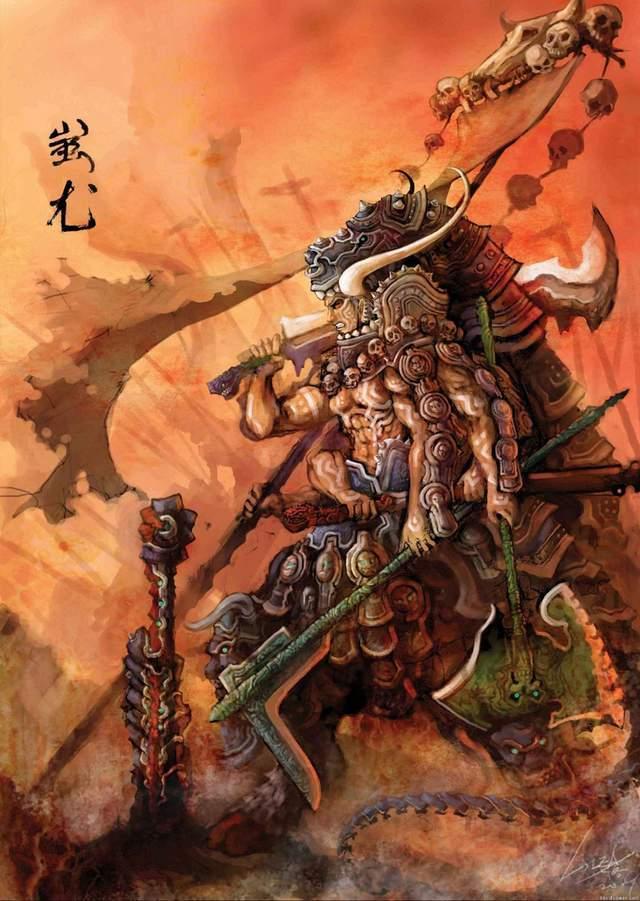- Who is Chiyou/Chi You?
- Chi You As the God of War and Master Weapon Smith
- Chiyou in Chinese Mythology
- Different Versions of the Chiyou Myth
- Chiyou’s Cultural Influence
- Reference
Who is Chiyou/Chi You?

- Name: Chiyou
- Parentage: Offspring of Yan Di, also known as the Flame Emperor
- Title: God of War
- Attributions: Credited with inventing military weapons
- Rebellion Against Huang Di:
- Rebelled against Huang Di, his father
- Faced defeat in the ensuing war and met his demise
- The chains that bound him transformed into a maple tree
- Weapon Creation:
- Created weapons such as the spear, dagger-axe, sword, and halberd
- Different versions depict him with numerous brothers, each possessing unique features
- Animal body, bronze head, iron forehead
- Ability to speak human language
- Human body, horned head, ox hooves, four eyes, six hands
- Ears and temples resembling swords and spears
- Central Event in Shanhaijing:
- Attack on Huang Di(the Yellow Emperor), described as one of the fiercest battles in Chinese mythology
- War involved powerful gods on both sides
- Chiyou’s formidable abilities posed a challenge for Huang Di
- Strategies Used Against Chiyou:
- Use of a drum made from the hide of Kui to prevent Chiyou from flying away
- Use of horns sounding like dragons to ward off Chiyou’s mythical animals
- Chiyou’s manipulation of clouds and mist countered by Huang Di’s invention of the compass
- Post-Death Reputation:
- Huang Di used Chiyou’s image to maintain peace in troubled times
- Revered as the god of war by military leaders during the Qin and Han dynasties
- Influence on Customs and Beliefs:
- “Chiyou’s Game,” a horn-butting tradition, emerged in Ji Province during the Han period
- Sacrifices to Chiyou in Taiyuan excluded ox heads, reflecting Chiyou’s ox-headed portrayal
- Miao ethnic group regarded Chiyou as their remote ancestor
- Oxen worshipped as symbols of luck and heroism
- Ox horn designs adorn clothes and silver decorations
- Miao Mythology and Festivals:
- Jiangyang, an ancestor in Miao mythology, born from a goddess hatched from a maple tree’s egg
- Festivals like “Trembling the Flower Mountain” in Yunnan Province trace their origins to the Chiyou myth
- After defeat, Chiyou planted a trunk with a red waistband, encouraging dancing and reed pipe playing to gather scattered tribes
- “Chiyou’s flag” commemorates the ancestral struggle against Huang Di and the migration of the Miao people to southern mountains
Read on for more details and learn about Chi You’s story in Chinese mythology.
Chi You As the God of War and Master Weapon Smith

The Wu Liang Shrine portraits are renowned stone carvings from the Eastern Han Dynasty. These intricate carvings adorn the dual gates and four stone shrines of the Wu family’s burial grounds, constructed over several decades beginning in the first year of Emperor Huan’s Jianhe era (147 CE) in present-day Jining, Shandong. The portraits depict historical figures, mythological tales, and scenes from the life of the tomb’s occupant, making them distinct and artistically valuable works among the Han Dynasty stone carvings, known for their precise dating and elevated artistic merit.
In ancient times, Chi You, the formidable leader of the Jiu Li Tribe, was not only a skilled weapon smith but also a master of war. This legendary deity is shrouded in various accounts of his appearance, with descriptions ranging from eight bull-like legs and multiple heads to wings and a bull’s head. What remains consistent across all tales is his invulnerability, making him impervious to swords and spears.
As a master weapon smith, Chi You excelled in the use of the sword, axe, and the ancient Chinese weapon known as Ge. This dagger-axe, similar to a halberd, showcased his prowess and bravery on the battlefield. His unwillingness to surrender without a fight made him renowned for his resilience.
Legend has it that Chi You faced Yan Di in the battle of Ban Quan, resulting in a defeat for Yan Di. To counter Chi You’s might, Yan Di joined forces with the Yellow Emperor, marking the beginning of an epic confrontation. The decisive battle unfolded in Zhou Lu, where Chi You led 81 extraordinary and powerful brethren. Despite his formidable army, Chi You was ultimately defeated by the alliance of Yan Di and the Yellow Emperor.
The title “Master Soldier” or “God of War” was posthumously bestowed upon Chi You by the Yellow Emperor. Chi You’s image adorned the army’s banners as a reminder of bravery in battle. The area around his burial site is said to have transformed into a blood-maple forest, a testament to the intense battles fought.
Different versions of the story offer intriguing details, including the Yellow Emperor’s act of respect in burying Chi You’s head with the body. Another version suggests that the Yellow Emperor painted Chi You’s likeness on banners to deceive potential enemies into thinking Chi You had surrendered and was now leading his armies.
Chi You’s legacy extends to his fallen brethren, as he commanded his troops to reanimate the dead after a fierce battle. The revived corpses, known as Jiang Shi, moved southward with magical assistance, fogging the minds of oncoming enemies. This act allowed both the living and the dead to escape, showcasing Chi You’s sense of honor even in the face of defeat.
Chiyou in Chinese Mythology
Chiyou, also known as Ch’ih Yu or Ch’iyu, is a prominent deity associated with war, rain, and the craftsmanship of weapons and metal in ancient Chinese mythology. Renowned for inventing metal weapons such as shields, metal-tipped lances, and axes, Chiyou’s myth holds diverse accounts of his actions and interactions with other deities.
According to one version of the myth, Chiyou engaged in metalworking in the mountains after the opening of these terrains by Huang Di, also known as the Yellow Emperor. This activity marked the inception of Chiyou’s legendary contributions to weaponry and metalcraft.
In an alternative narrative, Chiyou faced the Yellow Emperor in a battle, resulting in his defeat and eventual demise at the hands of Huang Di or his forces. Following Chiyou’s army’s ultimate defeat, his body is said to have traversed the battlefield before collapsing. As a symbolic gesture, Huang Di cast the shackles created by Chiyou into a field, where they transformed into maple trees.
Chiyou’s influence extends to other aspects of nature, as he is believed to rule over Yu Shih, the Rain Master, and Feng Po, a wind god.
The name “Chiyou” translates to reptile, and artistic representations vary, depicting him with the feet of a tortoise and the head of a snake or as a bull-like figure with hooves and horns. Some descriptions mention Chiyou and his 72 brothers having bronze heads with iron eyebrows. Intriguingly, it is said that this divine family sustained themselves by consuming rocks for nourishment.
Chiyou’s multifaceted character, combining elements of warfare, craftsmanship, and nature, adds layers of complexity to his role in ancient Chinese mythology. The varying depictions of Chiyou contribute to the enigmatic nature of this deity, showcasing the richness of cultural storytelling in the Chinese mythological tradition.
Different Versions of the Chiyou Myth

Chiyou, the offspring of Yan Di, also known as the Flame Emperor and the god of war, was a legendary figure credited with inventing military weapons. According to various ancient texts, Chiyou rebelled against Huang Di, his father, but faced defeat in the ensuing war and met his demise. The chains that bound him were said to transform into a maple tree.
Different versions of the Chiyou myth can be found in scattered ancient narratives, portraying him as Yan Di’s descendant who created weapons such as the spear, dagger-axe, sword, and halberd. Some versions depict him with numerous brothers, each possessing an animal body, bronze head, iron forehead, and the ability to speak human language. Chiyou’s unique features included a human body, horned head, ox hooves, four eyes, six hands, and ears and temples resembling swords and spears.
The central event in Chiyou’s life is recorded in Shanhaijing, detailing his weapon-making and attack on Huang Di. The ensuing war, described as one of the fiercest battles in Chinese mythology, involved powerful gods on both sides. Chiyou’s formidable abilities, including soaring into the sky and creating obstacles, posed a challenge for Huang Di.
However, Huang Di devised a strategy using a drum made from the hide of Kui, a one-legged mythical beast, whose thunderous sound prevented Chiyou from flying away. Another version involves Huang Di using horns sounding like dragons to ward off Chiyou’s ferocious mythical animals. Chiyou’s ability to manipulate clouds and mist led to a three-day fog, but Huang Di invented the compass to navigate through it, ultimately defeating and killing Chiyou.
Even after death, Chiyou retained a fearsome reputation. According to one version, Huang Di used Chiyou’s image to maintain peace in troubled times. The Qin and Han dynasties saw Chiyou revered as the god of war by military leaders, including the First Emperor of Qin.
Chiyou’s Cultural Influence
Chiyou’s influence extended beyond myths into customs and beliefs. “Chiyou’s Game,” a horn-butting tradition, emerged in Ji Province during the Han period. Sacrifices to Chiyou in Taiyuan excluded ox heads, reflecting Chiyou’s ox-headed portrayal. The Miao ethnic group regarded Chiyou as their remote ancestor, and beliefs about him persist in their daily lives. Oxen are worshipped as symbols of luck and heroism, with ox horn designs adorning clothes and silver decorations.
In Miao mythology, Jiangyang, an ancestor, was born from a goddess hatched from a maple tree’s egg. Festivals like “Trembling the Flower Mountain” in Yunnan Province trace their origins to the Chiyou myth. After defeat, Chiyou planted a trunk with a red waistband, encouraging dancing and reed pipe playing to gather scattered tribes. This tradition endured, with the colorful cloth on the pole known as “Chiyou’s flag,” commemorating the ancestral struggle against Huang Di and the migration of the Miao people to southern mountains.
Reference
- Jeremy. Chinese mythology A to Z, 1956-
- Birrell, Anne. Chinese Mythology: An Introduction. Baltimore and London: Johns
- Hopkins University Press, 1993, 50–53, 132–134, 192–193.
Cheng, Te-K’un. “Ch’ih Yu: The God of War in Han Art.” Oriental Art, n.s., 4.2 (1958): 45–54. - Christie, Anthony. Chinese Mythology. Rev. ed. New York: Peter Bedrick Books, 1985, 96.
- Duan, Baolin. “A Study of Chiyou” (in Chinese). Minzu Wenxue Yanjiu 4 (1998): 10–14.
- Walls, Jan, and Yvonne Walls, eds. and trans. Classical Chinese Myths. Hong Kong: Joint Publishing Co., 1984, 43–47.
- Wu, Zhengbiao. “Chi You’s Mythology and the Miao Customs.” Trans. Li Haixia. http://www.hmongtimes.com/displaynews.asp, 2003.
- Yuan, Ke. Myths of Ancient China: An Anthology with Annotations (in Chinese). Beijing: Renmin Wenxue Chubanshe, [1979] 1996, 128–143.
